8 Months Old Baby Milestones

- 8 Months Old Development Milestones Chart
- Major Milestones of 8 Months Old Baby
- When to Consult a Doctor
- Tips to Help Your Child Achieve 8-Month Milestones
- FAQs
Your eight-month-old is now nearing the big one! Feeling nostalgic about how the last eight months have flown by? An eight-month-old can now combine his motor skills with his sensory awareness to explore and seek adventures. His healthy growth accelerates his ability to move and coordinate. Your baby will now try to communicate with you much better and use words and language. His curious little mind will raise his awareness of the environment around him, and his antics will leave you amused on more occasions than one. Keep reading to learn about 8 months baby milestones and some tips and tricks to help them achieve those milestones to the best.
8 Months Old Development Milestones Chart
| ACHIEVED DEVELOPMENTAL MILESTONES | EMERGING DEVELOPMENTAL MILESTONES |
| Supports weight on both legs when upright | Stands holding support |
| Tracks moving objects | Tries to follow and catch moving objects |
| Manipulates objects by passing them between hands | Develops finer control of fingers for complex movements |
| Speaks words of simple syllables such as ‘M’, ‘D’, and ‘B.’ | Improves on the range of spoken syllables |
| Understands basic repetitive instructions | Can understand a wider range of unique instructions |
| Says “mama” and “dada” to any parent | Uses the correct noun for each parent |
| Develops pincer grasp | Can use hand to grab objects |
| Displays separation anxiety | Becomes more enduring about separation |
| Gets into crawling position quite easily | Attempts getting into standing position on his own |
| Understands the purpose of personal objects | Remembers objects in the house |
Major Milestones of 8 Months Old Baby
Your eight-month-old inching towards his first birthday just got a lot busier than before. Curiosity takes over from the moment he is awake, and every little thing piques his interest. It is time to baby-proof your house, as many things could find their way into your baby’s tiny mouth. As far as diet is concerned, your baby is developing taste and may demand certain kinds of solid foods. Your baby is crawling really fast, even trying to stand up with support and doing some incredible things that you would want to capture in your memory forever. He may now refer to his parents as “mama” and “dada”, even if it is to the wrong parent!
Cognitive Development
Cognitive abilities pertain to the baby’s intellectual prowess, development of the brain, and ability to comprehend things around him.
1. Linguistic Skills
Your baby can now speak basic syllables with “B’, ’M’ and ‘D’. He can associate basic nouns with things and even respond to the names of his siblings.
2. Curiosity
Constantly on the move, your baby will detect and investigate everything from household items to toys. Your baby will grab things, probe deeply to understand their functionality and try to decipher things (1).
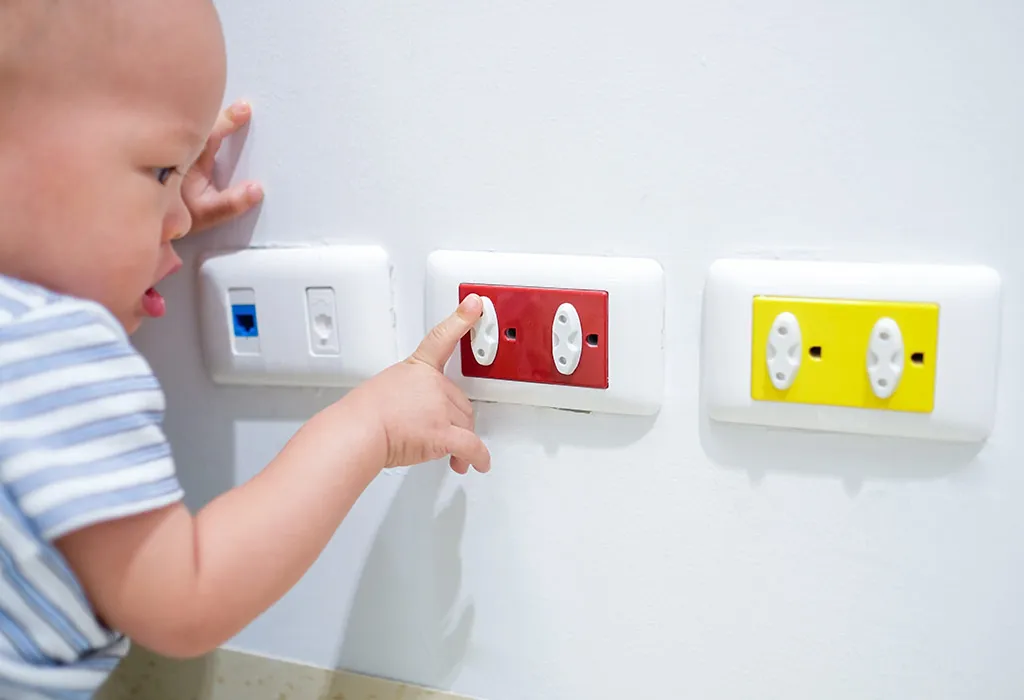
3. Comprehends Basic Instructions
Your baby will learn and recall basic instructions and iteration used repeatedly. For example:- if you say “No” shaking your head, he will understand that it is something that is not meant to be done, and obey you.
4. Track Objects
Try dropping the ball and watch with awe when your baby trails the object until it stops moving. At this stage, infants develop capabilities to foresee the path of falling or moving objects.
5. Pointing to Things with the Index Finger
Your baby will now use his index finger to point at objects that interest him (2).
6. Testing Reasons and Outcomes
Your baby will not try to get to the bottom of any object by testing it to its limits. This could involve throwing it, hitting it or banging it. He loves to get a response to his actions, and you might see your little one dropping his bottle or toy very frequently.
7. Relating Objects
Your baby will not associate objects with their purpose. For, e.g.: even if you offer an empty cup, he may put it in his mouth. If you swaddle your baby in a blanket, he will fall asleep.
Physical Development
These developments relate to gross motor skills, dexterity of the muscles and physical strength.
1. Sits Without Support & Bears Weight When Held Upright
Your baby will now get into the sitting position effortlessly and also stand upright with his weight balanced on his legs when you support him (3).
2. Develops Pincer Grasp
This is the ability to grasp an object using the first two fingers and thumb. An increase in arm strength and muscle growth enables the baby to pick up an object, manipulate it, and drop it (2).
3. Chew Food
Your baby will have his first few teeth by now and will try to chew on foods. Try giving foods which are boiled and not raw. He will work on his reflexes to mince food inside his mouth. Their food should be slightly coarser than pureed foods like mashed banana, mashed potatoes, lumpy pureed vegetables, and scrambled eggs (4).
4. Rolls in Both Directions and Crawls
Your baby can do a 180-degree flip on either side when placed on his tummy. Between seven to ten months, babies crawl at an effortless speed (5).
5. Improved Vision
Enhanced vision aids your baby in judging the distance between two objects and coordinating his vision with his limb muscles. He can judge where and what he is crawling towards and evade obstacles.
Social and Emotional Development Milestones
Your baby will now become more involved socially and emotionally. These accomplishments show his social skills, emotional disposition, and attitude towards people.
1. Separation Pangs
Your baby will show emotions of sadness or anxiety upon separation from a toy he dearly loves or a person who has been very close to him. This is termed as separation anxiety (6).
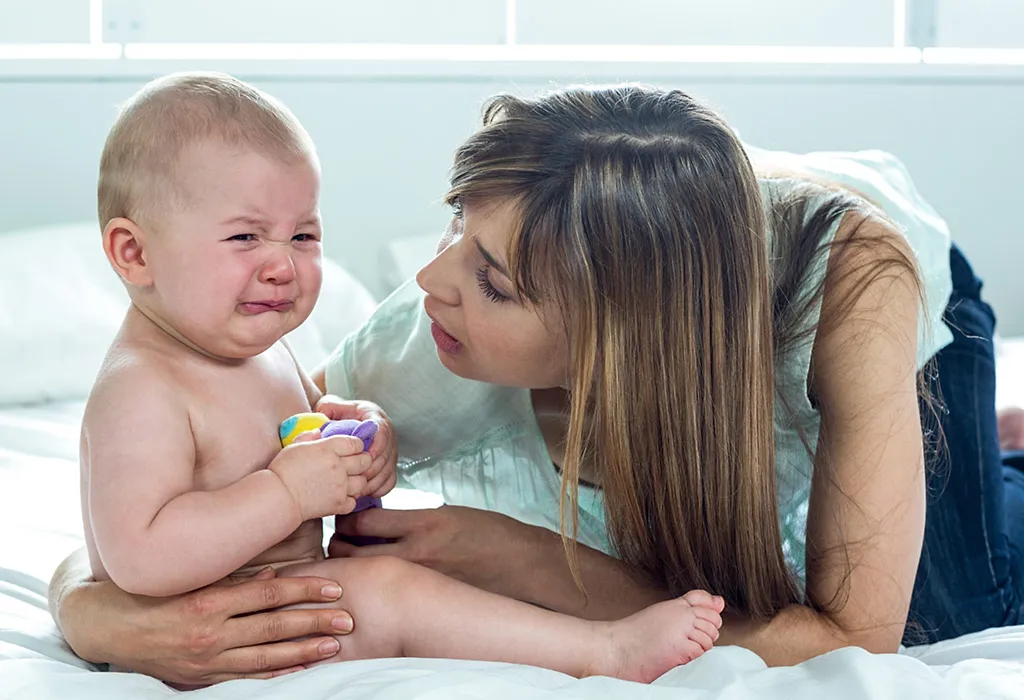
2. Heartwarming Greetings
Your baby will smile or let out a chortle on seeing you, or a close relative or friend when they arrive. He understands the importance of certain individuals in the family unit or friend’s circle.
3. Signs of Empathy
Your baby will empathise with his peers, especially when they cry. You may spot a grim or sad look on his face when he sees someone like himself in distress.
Communication Skills
- You may find your baby to be a budding Einstein, with him using hand and arm gestures to communicate.
- This is in addition to his linguistic skills where he uses basic syllables. Your baby will try and stretch his arms when he wants to be picked up.
- Your baby will now understand the importance of the word “No”.
- Keep talking to your child and engage in conversations to help him enhance his comprehension abilities.
When to Consult a Doctor
Here are some red flags that indicate some impediments in your child’s development:
1. Unable to Sit Without Assistance
If your baby does not sit on his own even when you help him, then it could indicate some disorder. You must seek medical advice if you notice flaws in his posture, or if he topples on being propped up.
2. Stiff Muscles
When you place your baby straight and upright, his legs must push the ground naturally. If his arms and legs are curled up tight, then it is a cause for concern.
3. Makes No Sound or Noises
Your baby may not use words or muffled figures of speech, but he needs to make simple sounds to exercise his vocal chords. If your infant is awfully or abnormally quiet, and you seldom hear any sounds from him, then it could indicate a serious developmental delay.
4. Does Not Recognise Familiar Faces
Failure to recognise familiar faces like grandparents or primary caregivers could indicate a neurological disorder. Babies with such disorders are detached and not sociable.
5. Has a Poor Gaze
If your baby has trouble focusing on things, struggles to look for the source of sound, or is unable to track even slow-moving objects, then you need to consult a doctor.
Tips to Help Your Child Achieve 8-Month Milestones
You can support your baby to achieve the milestones that need to be accomplished at each stage with some dedicated effort. Indulge in stimulating activities to help him grow better (7).
1. Interactive Play Sessions
Engage in conversations with your baby and involve him in activities that will stimulate his curiosity and thought process to decipher information and enhance cognitive abilities.
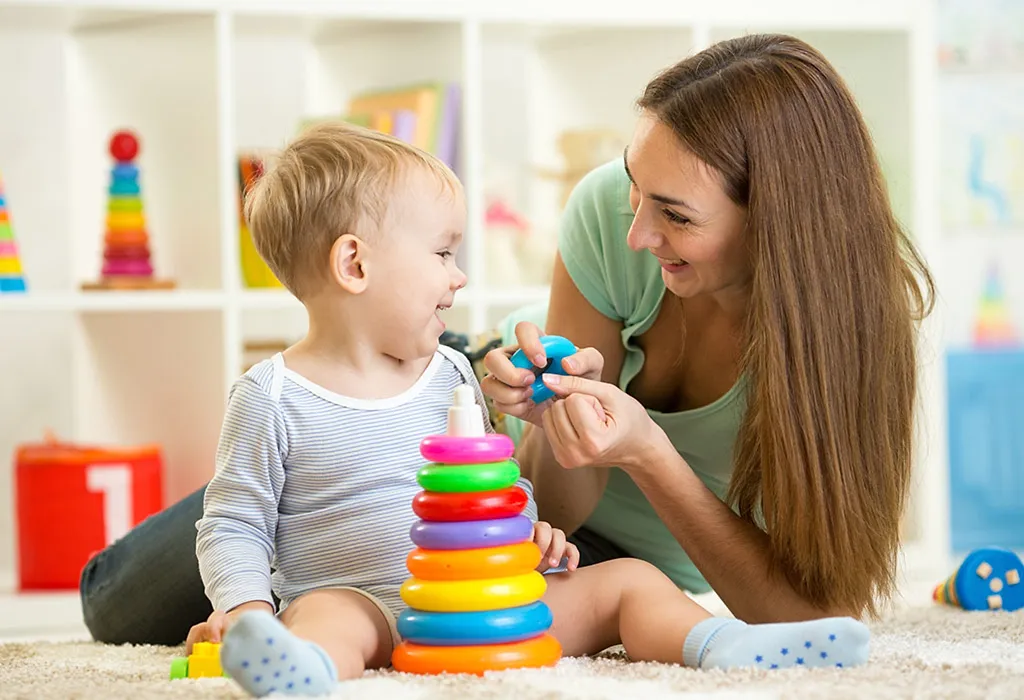
2. Give Names to Objects and Individuals
Assign names to toys and introduce individuals as you would want them to be addressed. This will assist in the object-noun association, and your baby will eventually learn it.
3. Story-time
Read stories from brightly illustrated books. Point out each word and to improve his vision and ability to recognise colours.
4. Increase Social Interaction
Involve yourself in social groups and meet new people to help your baby hone his social skills and enhance memory. This will also help to reduce stranger anxiety.
5. Play Games That Encourage Crawling
Crawling is an important activity to strengthen muscles. Introduce games like peek-a-boo or throwing and catching a ball to help him learn to walk.
FAQs
1. What is the duration of separation anxiety in babies?
Seperation anxiety has already started and can last until they are two years old. The good news that its as they grow, the separation anxiety does not last long and children are easily distracted once their caregiver is gone (8).
2. How to tell if my baby is developing fine?
Each baby develops and grow at their own pace. While some babies learn to talk early, some take their sweet time to even to crawl. As long as your baby is eating and pooping healthy, having his weight at an optimal levels, laughs, cries, and responds to all sensory stimulations, he is all good. There is no need to panic. As a parent, you must look out for your baby’s vision, speech, ability to sit without support, standing, etc., and if anything feels unusual, you should contact your paediatrician.
3. How to make your home a safe place to explore for your 8-month-old baby?
Exploration is a significant part of eight-month-old milestones. To make your home a safe haven for their exploration, here are some things you can do:
- Cover all electrical outlets using baby-safe electric guards.
- Put away all the poisonous chemicals, cleaning products, and cosmetics out of your baby’s reach.
- Block the stairs with child gates so they don’t hurt themselves.
- Lock up bathroom and kitchen cabinets.
Your eight-month-old baby would have a significant amount of accomplishments to his credit. You could nurture his skills by being hands-on and involving yourself in activities that will stimulate growth to aid his development faster. We hope you learned a great deal about milestones for 8-month-old baby that will help you nurture them to the best of your ability.
References/Resources:
1. Cognitive Development in Infants: 8 to 12 Months; American Academy of Pediatrics; https://www.healthychildren.org/English/ages-stages/baby/Pages/Cognitive-Development-8-to-12-Months.aspx
2. Your baby’s growth and development – 8 months old; Pregnancy Birth & Baby; https://www.pregnancybirthbaby.org.au/babys-growth-and-development-8-months-old
3. Milestone Moments Booklet 2021; CDC; https://www.cdc.gov/ncbddd/actearly/pdf/parents_pdfs/milestonemomentseng508.pdf
4. Sample Menu for a Baby 8 to 12 Months Old; American Academy of Pediatrics; https://www.healthychildren.org/english/ages-stages/baby/feeding-nutrition/pages/sample-one-day-menu-for-an-8-to-12-month-old.aspx
5. Infant development: Milestones from 7 to 9 months; Mayo Clinic; https://www.mayoclinic.org/healthy-lifestyle/infant-and-toddler-health/in-depth/infant-development/art-20047086
6. Emotional and Social Development: 8 to 12 Months; American Academy of Pediatrics; https://www.healthychildren.org/English/ages-stages/baby/Pages/Emotional-and-Social-Development-8-12-Months.aspx
7. 7-9 Month Old Baby Development & Milestones; CHOC; https://choc.org/primary-care/ages-stages/7-to-9-months/
8. How to Ease Your Child’s Separation Anxiety; American Academy of Pediatrics; https://www.healthychildren.org/English/ages-stages/toddler/Pages/Soothing-Your-Childs-Separation-Anxiety.aspx
Previous Month: 7 Months Old Baby Milestones
Next Month: 9 Months Old Baby Milestones
Was This Article Helpful?
Parenting is a huge responsibility, for you as a caregiver, but also for us as a parenting content platform. We understand that and take our responsibility of creating credible content seriously. FirstCry Parenting articles are written and published only after extensive research using factually sound references to deliver quality content that is accurate, validated by experts, and completely reliable. To understand how we go about creating content that is credible, read our editorial policy here.







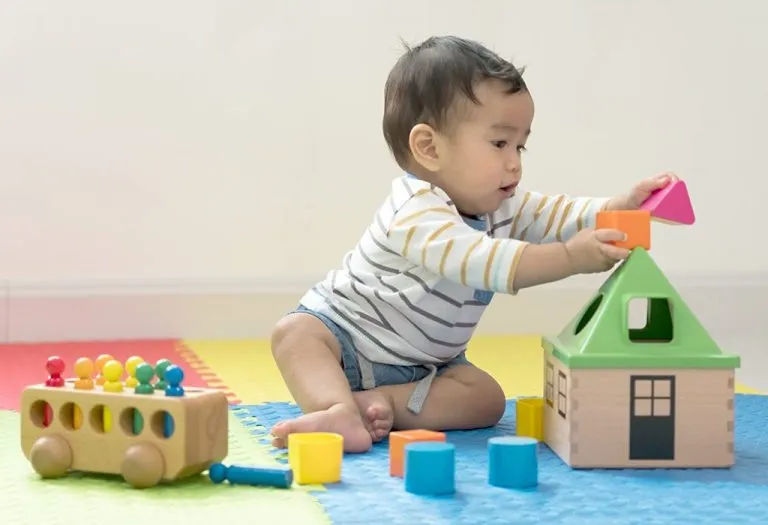
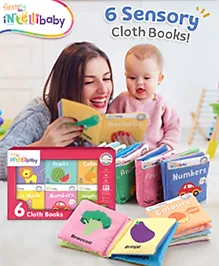
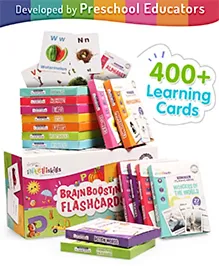
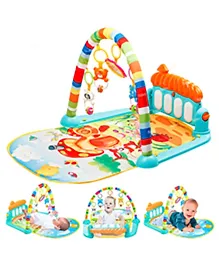
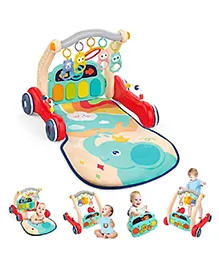
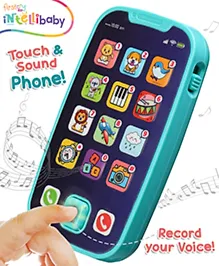
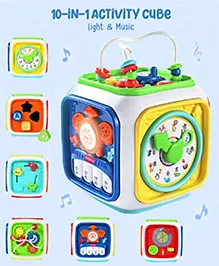
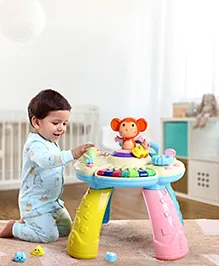
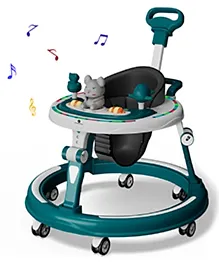
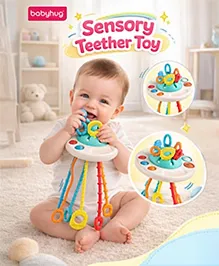
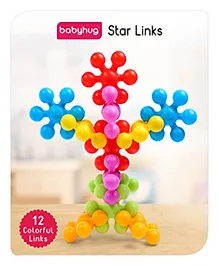
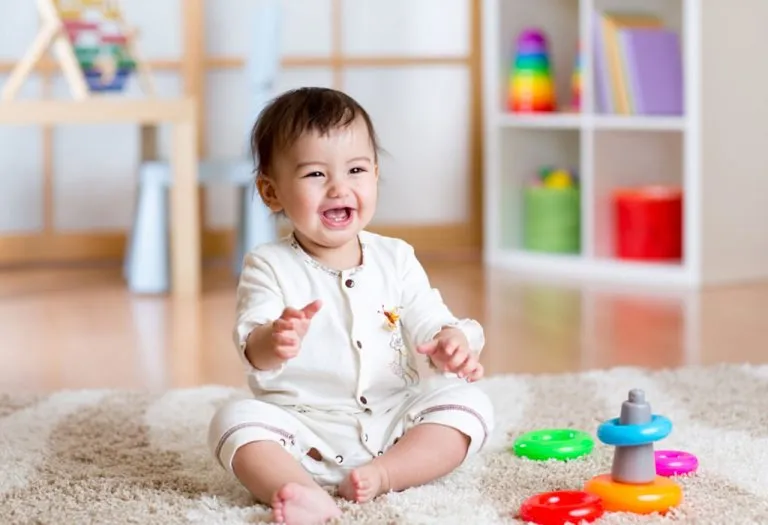
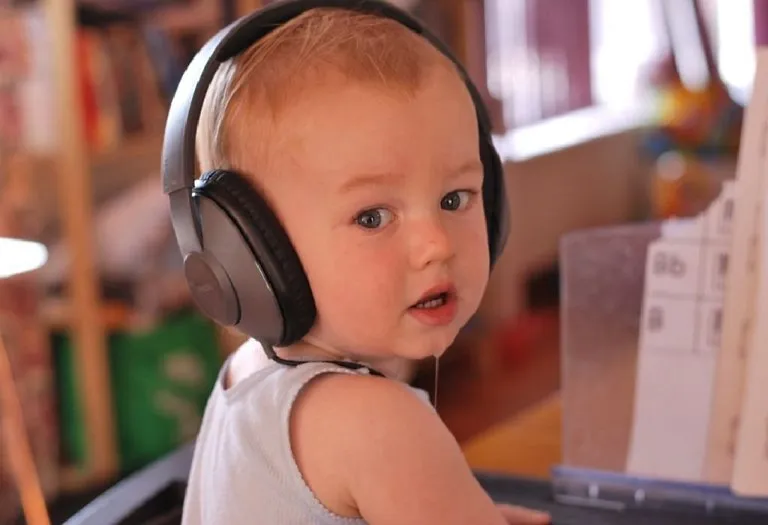
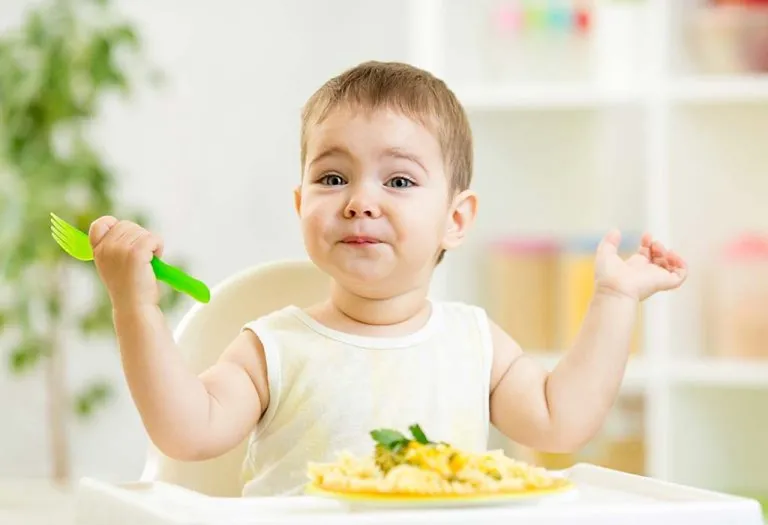
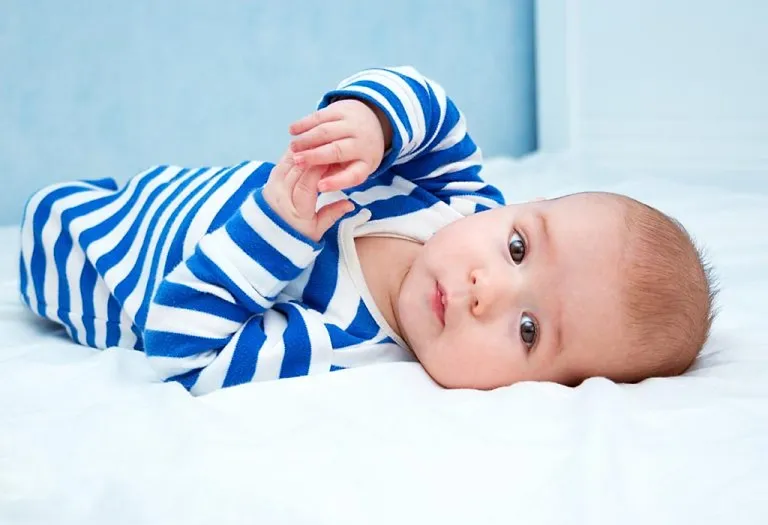
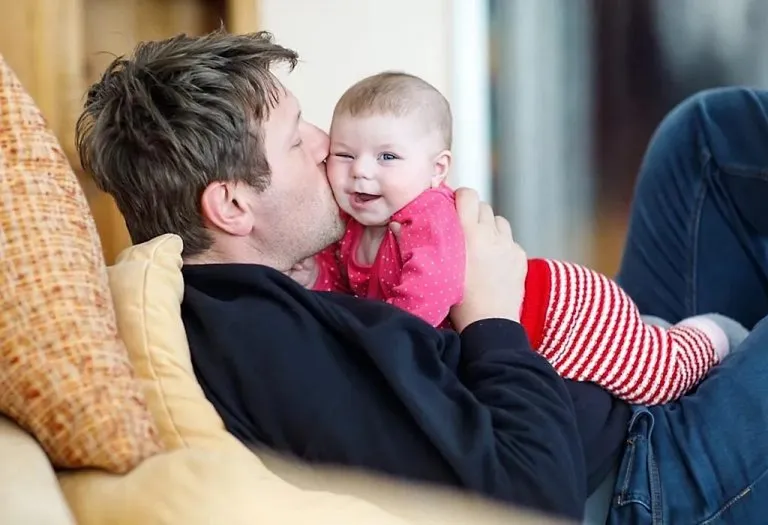
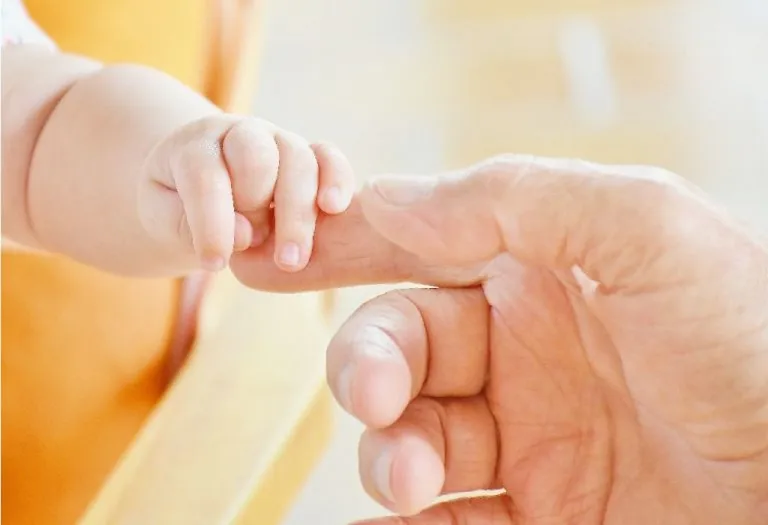

.svg)


















